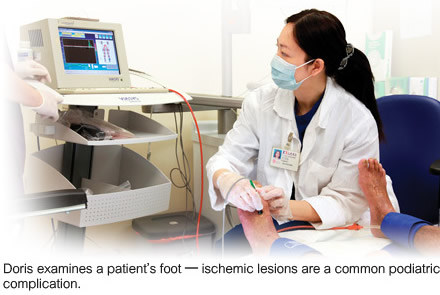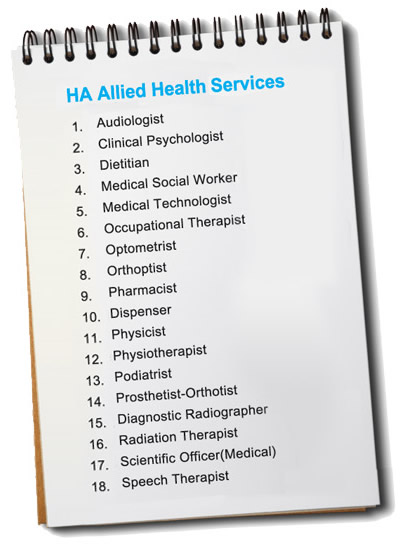


|
|
||||||||||
|
During her early studies, Doris received a Hospital Authority scholarship to complete her fundamental clinical training in the UK. After returning to Hong Kong as a registered podiatrist, she has been serving in QEH since then. "There are around 40 podiatrists in Hong Kong - just one for every 180,000 people - and over 70% are employed by the HA," she explained. "I was attracted to podiatry because it offers the chance to provide one-stop holistic care to patients including examination, diagnosis, treatment, prescription and rehabilitation." Most of the patients with chronic diseases who have ignored a minor injury, resulting in further complications that need for more invasive treatment and amputation in some cases. Doris remembered an elderly lady who was hit by a bus and had to have her forefoot amputated. Worse still, she did not manage her amputation wound properly and resulted in long-term bleeding. Unable to walk, the lady became very depressed and could not reach out for a compensation claim. However, after six months under Doris' care, the lady can walk with closed wounds and she regained her confidence. What is most important, being amputated, she could walk out for a compensation fund claim which provided sufficient funds for her husband to live in a home for the elderly for 10 years. The patient's husband, still appreciates how Doris took care of his wife. Doris says it is the warm rapport she built with patients that makes her job so gratifying. |
||||||||||
|
|
||||||||||
|
Joshua Mak, Senior Speech Therapist at Tuen Mun Hospital and Cluster Coordinator (Speech Therapy) of New Territories West Cluster (NTWC) explains. "Our work is mainly divided into two parts: one is communication related, such as the language comprehension, expression and pronunciation of language. The second covers swallowing issues - for example, helping patients who have choking problems caused by different varieties disease or brain damage." He says swallowing-related issues are on the rise in Hong Kong, due to the aging population and the increase in certain chronic diseases. In 2012, swallowing problems accounted for 90% of new in-patient cases referred to NTWC speech therapists and 65% of out-patient cases. There is certainly a strong demand for speech therapists, with a 100% employment rate for local graduates in this discipline. Joshua has worked in this field for 24 years, stating that he was the sixth speech therapist ever in Hong Kong at the time he started his career. "I chose this career because of my niece, who was born a deaf-mute. I wanted to help her have a normal life. She can now perform well in lip-reading with 90% accuracy and doesn't need to use sign language - with her hearing aids, she can communicate very well. Helping people regain the ability to communicate is very meaningful work."
Joshua's most memorable case to date is definitely helping Jason - who suffered brain injuries during the Manila hostage crisis two years ago - to say "Mum" again. "Jason's case wasn't a difficult one, but the high level of public attention and expectation for his speedy recovery created certain degree of pressure. I remembered I first taught him to regulate his breathing using a speaking valve and he practised how to phonate properly. After four sessions, he started to say his first word - "Mum". His mother and I were so moved. He can now handle daily communication and pronounce words clearly."
|
 |
|||||||||
|
|
|
|
|
|
|
||||

